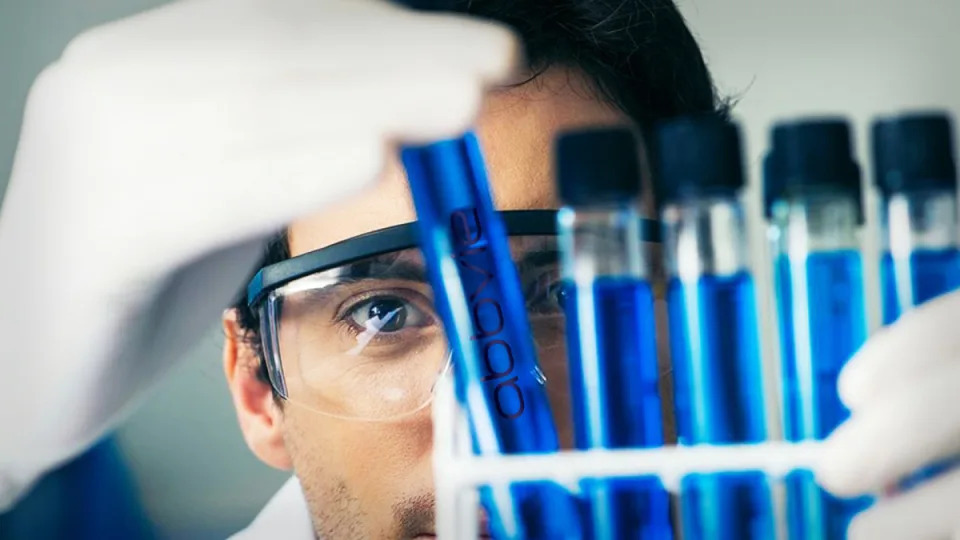Analyst revises AbbVie stock price target on drug-sale estimates
On Jan 2, 2013, Abbott Laboratories ( ABT ) went in two different directions.
The global health-care company said it had completed the separation of its research-based pharmaceuticals business, which became AbbVie ( ABBV ) , taking part of the original company's name and melding it with the Latin word for "life."
Related: Analysts revamp AbbVie stock price target after earnings report
The company would be run by Richard Gonzalez, who was then Abbott's head of global pharmaceuticals, and it had nearly $18 billion in annual revenue, about half of that coming from its blockbuster rheumatoid-arthritis drug, Humira.
AbbVie grew to become one of the world's largest biomedical companies. It currently has a market capitalization of $334.63 billion.
In July the North Chicago company said Robert Michael, previously AbbVie's president and chief operating officer, was taking over as CEO and Gonzalez would become executive chairman.
"I look forward to building on our track record of success and delivering on AbbVie's promise to our patients, employees, shareholders and communities," Michael told analysts during the company's July 25 earnings call .
"As we begin this new chapter, nearly every aspect of AbbVie's business is performing at or above our expectations," he said. "We are demonstrating a rapid return to revenue growth with operational sales up nearly 4% through the first half of this year, including robust mid-single-digit growth in the second quarter."

Abbvie/TS
AbbVie boosts full-year guidance
Sales of Humira, once the world's top-selling medicine, have been declining with the introduction to the U.S. market of multiple biosimilar versions of the therapy, Reuters reported . Ten of the close copies are now available in the U.S.
Humira's global sales fell nearly 30% to $2.81 billion in Q2 but still topped analysts' consensus estimate of $2.76 billion.
Related: Analysts reset targets for Eli Lilly shares
"Humira performance continues to meet our expectations, having achieved or exceeded our guidance in all six quarters with biosimilar competition," Michael said.
Here are the numbers: AbbVie earned $2.65 a share, down from $2.91 a year earlier and beating the analyst consensus estimate by 8 cents. Revenue totaled $14.46 billion, up 4.3% from a year earlier and beating the estimate of $14.03 billion.
The company boosted both ends of its full-year profit-forecast range by 10 cents — two cents more than the second-quarter beat — and now expects to earn between $10.71 and $10.91 a share.
On Aug. 1 AbbVie completed its $8.7 billion acquisition of Cerevel Therapeutics, which develops therapies to treat neurological and psychiatric disorders.
"The pending acquisition of Cerevel will further augment our neuroscience pipeline, and we're excited about what our two companies can achieve together to make a difference for patients with neuropsych disorders," Michael said.
The company’s pipeline products are aimed at neurological and psychiatric conditions such as Parkinson's disease, schizophrenia and mood disorders.
One those products is Emraclidine, a treatment for schizophrenia, a chronic and severe neurological brain disorder that affects roughly 24 million people, or 1 in 300 people worldwide, according to the World Health Organization.
AbbVie CEO cites 'best-in-class therapies'
Onset is most often during late adolescence and the twenties, and onset tends to happen earlier among men than among women.
Roughly 2.8 million adults in the U.S. aged 18 or older suffer from the condition and an estimated 40% of individuals with schizophrenia are untreated in any given year, the Treatment Advocacy Center said.
More Health Care:
Roopal Thakkar, executive vice president of research and development, told analysts that the emraclidine pivotal studies in schizophrenia "remain on track to begin reading out near the end of this year."
"We're obviously very excited about the potential best-in-class therapies in Cerevel's pipeline, especially emraclidine for schizophrenia, davapidon for early Parkinson's, and their core antagonist for major depression," Michael said. "I mean, these assets clearly will be great additions to our neuroscience franchise."
Analysts have adjusted their price targets for AbbVie following the company's earnings report.
On Aug. 12 Morgan Stanley raised its price target on AbbVie to $218 from $211 while maintaining an overweight rating on the shares. The investment firm noted the sales estimates for emraclidine, according to The Fly
Morgan Stanley sees risk-adjusted sales of $2.3 billion by 2033.
The investment firm assigned a 70% probability of success for the lead schizophrenia indication and sees a potential stock move of 5% depending on the outcome of Phase 2 testing.
Phase 2 studies determine the effectiveness of an experimental drug on a particular disease or condition in about 100 to 300 volunteers.
On July 26 Truist raised its price target on AbbVie to $210 from $195 and affirmed a buy rating on the shares.
The company’s “strong” second-quarter revenue and earnings beats were led by Skyrizi/Rinvoq, the firm said. Skyrizi treats a number of disorders including psoriasis and Crohn's. Rinvoq targets diseases including severe rheumatoid arthritis.
Truist also said that it saw strong performance across AbbVie’s diversified portfolio, with potential for growth into the end of the decade.
Also on July 26 Barclays raised its price target on AbbVie to $200 from $187 and affirmed an overweight rating on the shares.
Related: Veteran fund manager sees world of pain coming for stocks

